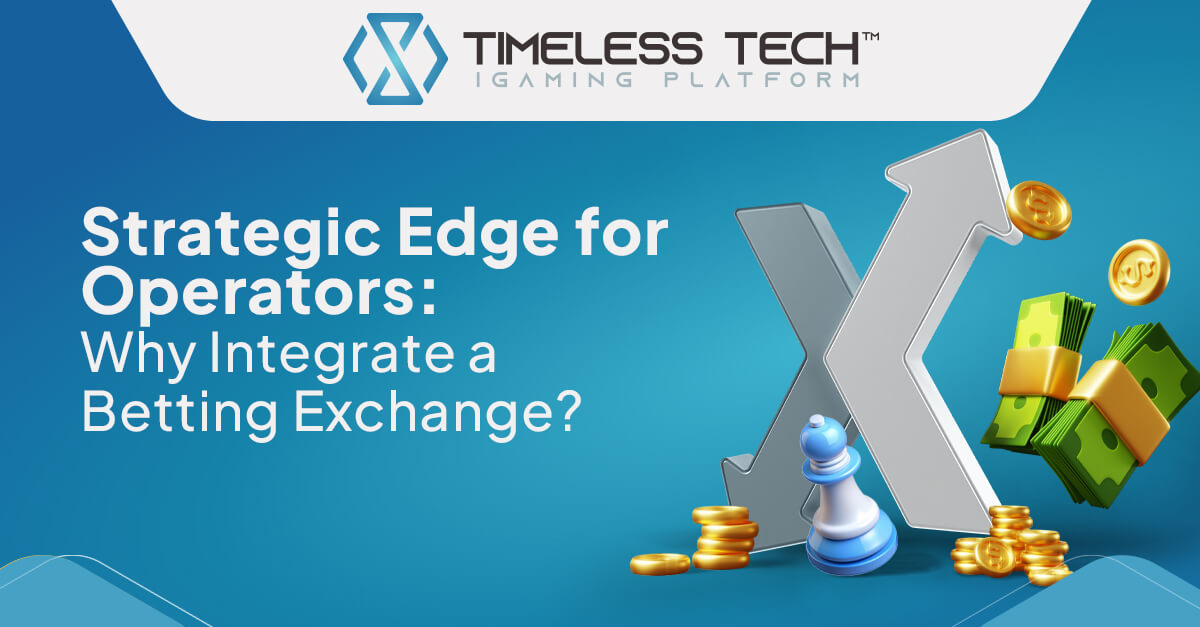As the iGaming market matures and user behavior becomes more sophisticated, operators are under growing pressure to diversify their offerings, lower financial exposure, and deliver sustainable long-term growth. One of the most effective tools to meet these goals is integrating a betting exchange platform into your sportsbook or casino offering.
Unlike traditional sportsbooks that operate on fixed odds and house-driven risk models, a betting exchange introduces a peer-to-peer betting ecosystem where the operator’s role shifts from market maker to platform facilitator. This shift unlocks a new set of competitive advantages — from lower operational risk to increased player lifetime value.
In this article, we explore the key reasons why a BetExchange integration (such as Timeless Tech’s scalable exchange platform) gives operators a strategic edge in today’s sports betting landscape.

Why Add a Betting Exchange to Your Platform?
1. Risk-Free Revenue Model
In traditional bookmaking, the operator assumes financial liability for every wager. If a betting market is unbalanced or if odds are mispriced, the operator pays the price.
A betting exchange flips this model.
Since players bet against each other, not against the house, the platform earns a fixed commission on net winnings. That means:
- No direct exposure to market volatility
- No need to hedge high-risk bets
- More predictable margins, even in high-volume scenarios
This model is ideal for operators looking to scale without increasing financial risk.
2. Attract a High-Value Player Segment
Betting exchanges naturally appeal to strategic, informed bettors — users who seek value through market dynamics rather than simple luck. These players are:
- More loyal to platforms that offer control
- More active during live events and in-play markets
- More likely to trade, hedge, and re-engage
By adding an exchange, you expand beyond the casual segment and attract a diverse, high-LTV player base that traditional sportsbooks often miss.
If you haven’t yet explored how exchanges empower these players, revisit Article 2 in this series.
3. Improve Player Retention with Dynamic Interaction
A standard sportsbook offers a linear experience: select, bet, wait. A betting exchange turns this into a multi-phase interaction:
- Set your own odds
- Accept or lay other players’ odds
- Adjust positions before or during the event
This dynamic market structure boosts:
- Time-on-site metrics
- In-play engagement
- Stickiness across events and verticals
Engaged users become returning users — especially in competitive, live-betting markets.
4. Scalable Infrastructure with Lower Operational Overhead
Well-architected exchange platforms like Timeless Tech’s BetExchange are built for global scalability:
- Add thousands of users without manual market balancing
- No need for risk traders or liability models
- Easily manage multiple currencies, feeds, and interfaces
Whether you operate in a regulated market, a sweepstakes model, or a white-label environment, this scalability makes the exchange model cost-efficient and growth-ready.
5. Reduced Payout Liability
In traditional sports betting, big wins can hurt your bottom line. But in an exchange, since users take on each other’s positions, your platform is never directly responsible for large payouts.
This lowers your exposure to:
- Unexpected winning streaks
- Arbitrage and bonus abuse
- Fraud-related liability
It also enables smarter liquidity management across your ecosystem.
How Betting Exchanges Fit into the Bigger Picture
Adding an exchange is not just about ticking a product box — it’s about enabling a smarter ecosystem where your platform hosts a living marketplace rather than managing one.
If you missed it, Article 1 of this series explains the basics of how betting exchanges work and why the peer-to-peer model is a revolutionary shift for the industry.
Together with commission-based monetization, dynamic user control, and operational simplicity, this model sets the foundation for a more resilient iGaming business.
Frequently Asked Questions (FAQ)
What’s the difference between a betting exchange and a traditional sportsbook for the operator?
In a sportsbook, the operator carries the risk and earns from the odds margin. In an exchange, users bet against each other, and the operator earns a commission — with no exposure to bet outcomes.
Do betting exchanges work in regulated markets?
Yes. Betting exchanges are legal in many regulated jurisdictions, often with clear frameworks. Timeless Tech’s platform is built with certification readiness and compliance tools to fit most market requirements.
Can I integrate a betting exchange alongside my existing sportsbook?
Absolutely. Many operators run both models side-by-side, giving users more choice and flexibility while maximizing monetization.
What type of players prefer using betting exchanges?
Strategic bettors, value hunters, matched bettors, and live-trading users — typically users with higher engagement, retention, and bet frequency.
Is managing an exchange more complex than a sportsbook?
Not at all. Since the exchange doesn't require odds trading or liability management, it can actually reduce your operational complexity.
How is revenue generated on a betting exchange?
Operators typically charge a commission on net profits (e.g., 2-5%) per winning bet. This makes revenue more predictable and consistent across large volumes.
Conclusion
Integrating a betting exchange is more than a feature — it’s a strategic pivot. With:
- Commission-based, risk-free revenue
- High-value player appeal
- Built-in scalability
- Lower operational load
- Greater long-term retention
Operators position themselves to compete smarter, grow sustainably, and stand out in saturated markets.
Explore the possibilities of peer-to-peer betting — and unlock a new edge for your platform.
Learn more about BetExchange by Timeless Tech

